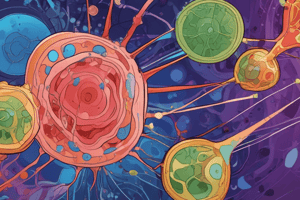Podcast
Questions and Answers
What happens to the SRP after binding to the SRP receptor on the ER membrane?
What happens to the SRP after binding to the SRP receptor on the ER membrane?
- It is released from the ribosome and the signal sequence. (correct)
- It is inserted into the ER membrane.
- It is degraded by proteases.
- It is phosphorylated and becomes active.
What is the function of the signal sequence in protein translocation?
What is the function of the signal sequence in protein translocation?
- To open the translocon by moving a plug away from the channel. (correct)
- To insert into the membrane channel.
- To cleave the polypeptide chain.
- To bind to the SRP receptor.
What is the final destination of proteins inserted into the ER membrane?
What is the final destination of proteins inserted into the ER membrane?
- The Golgi apparatus.
- The cytosol.
- The plasma membrane or lysosomes. (correct)
- The lysosomes.
What is the function of the hydrophobic transmembrane α helix in integral membrane proteins?
What is the function of the hydrophobic transmembrane α helix in integral membrane proteins?
What happens to the hydrophobic transmembrane domain of the protein during insertion into the ER membrane?
What happens to the hydrophobic transmembrane domain of the protein during insertion into the ER membrane?
Where are proteins destined for the endoplasmic reticulum, Golgi apparatus, lysosomes, plasma membrane, and secretion from the cell synthesized?
Where are proteins destined for the endoplasmic reticulum, Golgi apparatus, lysosomes, plasma membrane, and secretion from the cell synthesized?
What is the main function of the signal recognition particle (SRP)?
What is the main function of the signal recognition particle (SRP)?
What is the typical location of signal sequences in polypeptide chains?
What is the typical location of signal sequences in polypeptide chains?
What is the purpose of vesicular transport between the endoplasmic reticulum, Golgi apparatus, and lysosomes?
What is the purpose of vesicular transport between the endoplasmic reticulum, Golgi apparatus, and lysosomes?
What is the difference in protein targeting pathways between mammalian cells and yeast?
What is the difference in protein targeting pathways between mammalian cells and yeast?
Flashcards are hidden until you start studying
Study Notes
Protein Sorting and Targeting in Eukaryotic Cells
- Protein sorting and targeting involve complex processes due to the internal organization of eukaryotic cells.
- The first step of protein sorting occurs during translation, while the polypeptide chain is still being synthesized.
Targeting Proteins to the Endoplasmic Reticulum
- In mammalian cells, most proteins enter the ER co-translationally, whereas in yeast, both co-translational and post-translational pathways are used.
- The amino acid sequence of the polypeptide chain being synthesized targets ribosomes for binding to the ER membrane.
- Signal sequences, typically 15-40 amino acids long, including 7-12 hydrophobic residues, are recognized and bound by the signal recognition particle (SRP).
- The SRP binds the ribosome, mRNA, and growing polypeptide chain, inhibiting further translation and targeting the complex to the rough ER.
Co-Translational Pathway
- The SRP binds to the SRP receptor on the ER membrane, triggering the hydrolysis of GTP bound to the SRP, releasing the SRP from the ribosome and signal sequence.
- The ribosome then binds to a protein translocation complex or translocon in the ER membrane, and the signal sequence is inserted into a membrane channel.
- The growing polypeptide chain is transferred through the translocon as translation proceeds, and the signal sequence is cleaved by signal peptidase.
Insertion of Proteins into the ER Membrane
- Proteins destined for the plasma membrane or membranes of compartments are initially inserted into the ER membrane instead of being released into the lumen.
- Integral membrane proteins are embedded in the membrane by hydrophobic sequences that span the phospholipid bilayer.
- The membrane-spanning portions of these proteins are usually α-helical regions consisting of 20-25 hydrophobic amino acids.
- The hydrophobic transmembrane α helix signals a change in the translocon, causing the membrane-spanning helices of the translocon to open and allowing the hydrophobic transmembrane domain of the protein to exit the translocon laterally.
Studying That Suits You
Use AI to generate personalized quizzes and flashcards to suit your learning preferences.




